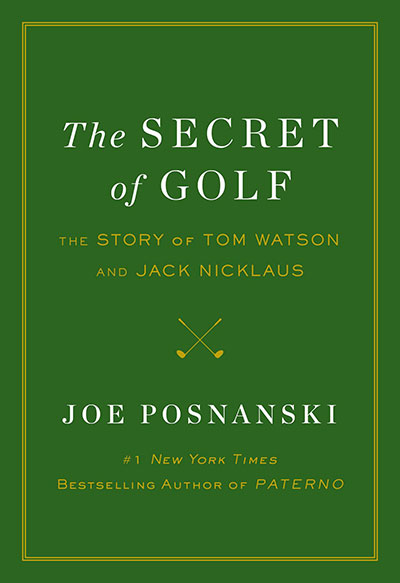

A Conversation with Sportswriter and Author Joe Posnanski
By THIRSTY

Joe Posnanski (credit: Jeff Siner)
Joe Posnanski has led a storied career. His book Paterno rocketed to #1 on The New York Times Best Seller list on the day it debuted. He was named National Sportswriter of the Year by the National Sportscasters and Sportswriters Association. The Associated Press Sports Editors named him the Best Sports Columnist in America. The Baseball Bloggers Alliance named an award after him. He has written for magazines and newspapers that include Sports Illustrated and The Kansas City Star, and he is currently a national columnist for NBC Sports. Reviewers have praised him as an outstanding journalist and a hall of fame writer. His fourth book, The Secret of Golf – The Story of Tom Watson and Jack Nicklaus, was released this summer and Stay Thirsty Magazine was honored to visit with Joe Posnanski at his home in Charlotte, NC, for this Conversation on everything from golf to sports journalism to the secret of his success.
STAY THIRSTY: In 2012, the New York Times said this about you: "…In other words, Posnanski revels in sports for their own sake, but also eagerly plumbs them for metaphors for life." When you sat down to write your latest book, The Secret of Golf – The Story of Tom Watson and Jack Nicklaus, what metaphors were you expecting to discover in the Watson-Nicklaus relationship and in their individual games of golf? Were your expectations met or did these two legendary players surprise you?
JOE POSNANSKI: I don't know that I had any specific expectations, but I've always thought that golf is a perfect little microcosm of that lifelong pursuit of excellence. I'm fascinated by the idea of how people become great at things – how they become great poets or great magicians or great violinists or great surgeons. The answer, I've come to believe, is a combination of the interesting (inspiration, obsession, passion, talent) and the utterly mundane (repetitive practice). Every awe-inspiring magic trick you've ever seen required countless hours of mind-numbing preparation. So it goes with golf.
So with Watson and Nicklaus – particularly Watson as he's the heart of the book – I wanted to try and get behind what drives someone to become the best in the world. I wanted to try and understand what kept them on the golf course practicing when it was 100-plus degrees outside and nobody else was around. I wanted to try and understand why they kept wanting to get better even after achieving what most people would call success. Watson talks often about The Secret – that's the inspiration for the title – so I wanted to know what The Secret really means.

STAY THIRSTY: You organized The Secret of Golf like an 18-hole round of golf with "secrets" interspersed between the golf holes. It is often said, no one owns the game of golf, it owns you. And yet, everyone seeks the Holy Grail "tip" or "secret" or "grip change" that will revolutionize his or her own game. Is golf really about tips and secrets or about mental attitude and discipline? How did Tom Watson see it and was it different that how Jack Nicklaus did? Is there some commonality amongst the greats that mere mortals either don't have or can never have?
JOE POSNANSKI: I don't think golf is really about secrets in a general sense – meaning tips and lessons and thought keys. But I do think there are secrets in a grander way, secrets that you learn along the way and make your golf game better, more fun, more rewarding and so on. I suppose that's mental discipline, but I don't think it's the same for every person. I think Tom Watson's secret is different from Jack Nicklaus' secret is different from the guy next door who is a 15-handicap.
Watson is a very literal man; to him the Secret of Golf is a very specific swing pattern that he discovered one day when his game was falling apart. Nicklaus, meanwhile, is a very ordered thinker, point by point by point, and I think for him the Secret of Golf is this checklist he has in his mind of every little thing he needs to do well (head straight, slow takeaway, depth of shoulder turn, etc.). I wouldn't recommend that for anyone else; that's where we get into the difference between the greats and us mortals.
But, yes, I think there's commonality in that playing golf well (I believe) comes down to a sense of understanding your own body, your own swing, what works, what doesn't work and, even more importantly, WHY something works or doesn't work. I think it's the same sort of mental discipline required for tennis or crossword puzzles or video games or anything else that we're trying to do really well.
STAY THIRSTY: What is it that fascinates you about golf and what keeps people coming back to not only play the game, but also watch it on television?
JOE POSNANSKI: For me, it definitely comes down to that pursuit of perfection. On the playing side, there's nothing quite like hitting a perfect shot. For one moment in time, you can hit a golf ball as well as anyone who ever played the game in the long history of what they first called gawf. It just takes one of those shots, just one, to make a day wonderful. You can be a lousy player, and you can shoot 100, but if you chip in from the fringe or if you hit an approach shot that dances around the cup or if you nail a drive longer than ever before, it makes the whole day. I like what Nicklaus said about golf – it's a great game to not quit at. In other words, no matter how badly it's going, the moment you hit a great shot the whole game comes alive again.
As for why people watch the best golfers – that, to be honest, is really what motivates me. I'm not really a golfer. But I love the game, love watching the best in the world play, and as mentioned it does come down to that pursuit of perfection, I think. I am thoroughly mesmerized by people who do things brilliantly, whether it's golf or parallel parking an 18-wheeler truck or building a wall or installing a light fixture. Golf is such a pure version of the quest. It's the simplest thing imaginable – put the ball here in that hole all the way over there in as few strokes as you can. It's simple and it's seemingly impossible; I love to watch the best people in the world do it.
STAY THIRSTY: Great athletes are revered in America, regardless of their particular sport. With great prowess comes great fame, fortune and the loss of privacy. To be an athletic hero is to live a life very much out loud and be subject to the opinions of sports journalists as well as the celebrity media. Is there a different esprit de corps among sports journalists vs. journalists who write for celebrity magazines?
JOE POSNANSKI: I suppose there is a different vibe, though I wonder if it mostly comes down to access. There is, as we know, very little access to celebrities – great actors, musicians, directors and so on. They will do publicity, the occasional junket or press parade, but it's not part of their daily work. A director does not, after a day's shooting, have to go in front of a large media corps and explain how it went. An actor never has to say, "Yeah, I didn't have as good a day today on the set as I would have liked, but tomorrow's another day."
But an athlete does every single time. I think about this; LeBron James or Tiger Woods or Tom Brady will play a game and then, almost instantly, have to explain what went right, what went wrong, how they feel. On the one hand, it gives sportswriters a little bit more insight into them as people – an insight we're supposed to try and share. On the other hand, most of the access is bland, cliché, very surface and doesn't give any insight at all. It's just a different job writing about Peyton Manning than it is writing about Christian Bale.
I think sportswriters – like celebrity journalists – are also very different in the way they individually handle the job. Some people just want to comment, like critics. Some break news. Some try to get inside. It feels possible to get to KNOW athletes in a way that I don't think is as realistic with movie stars. But I also wonder if a lot of that is a trap; do we really get to KNOW any of these people? It's something I think about a lot. What's fun about doing a book like The Secret is that I've written about Tom Watson for 20 years, and to a lesser extent Jack Nicklaus for the same time, so I feel like, while I may not KNOW them in that capital letter sense, I know an awful lot about them. I feel like I KNOW some of the things that drive them, some of the things that thrill them, and it felt to me like a goods story.
STAY THIRSTY: What drew you to become a sports journalist and an author? Is there a moment in your career that inspired you or gave you clarity about your future as a writer?
JOE POSNANSKI: I tell classes this all the time, in part because it's funny and in part because it's absolutely true – I was taking the bus home from college one day and we went by this business park. I was an accounting major then, and I remember looking out the window at all the people in their power suits, carrying their satchels and briefcases and purses, talking about whatever business things people talk about – and I had this out-of-body experience, this moment of clarity, when I realized that would never be me. I would never be in a business park working a 9-to-5 job.
Coincidentally, that was the day I had failed out of accounting.
I had no idea what to do then, no clue whatsoever what talents I had, and it's fair to say I just sort of fell into writing sports for the local newspaper. Once I did, though, it was instantly clear to me that it was exactly what I was meant to do. I loved doing it but, more, I was hungry to get better. I had never really been all that motivated to get better at anything up to that point. I think that's why I'm so fascinated by golf and all those things I mentioned earlier; this idea of what drives us to get better is one I think about all the time because of my own life. I just love everything about writing – sports and other things. I love telling stories. I love the way I will begin writing one thing and then, as if turned by the wind, I write something else entirely. There are exhausting elements of being a sportswriter and author – the travel, the issues of access, the countless responsibilities that go along with it. But the writing itself is as much fun as it has ever been.
STAY THIRSTY: You wrote a celebrated book, The Soul of Baseball, about the baseball player, Buck O'Neil, and traveled America with him when he was in his nineties. Why did you decide to engage in this odyssey and how did you feel when the journey came to an end?
JOE POSNANSKI: The idea came directly out of my friendship with Buck O'Neil. He had wanted me to write a book about the Negro Leagues, and I actually went down a completely different path, one that did not work out at all. When I realized it was not going to work out, I decided to ask Buck if I could instead tell the story through him and his travels around American to share his life experiences with baseball. He said three words: "Don't be late."
The end of the journey was particularly sad in this case because Buck died just as I finished writing the book. But Buck had always said that nobody should ever feel sad for him – he lived 94 remarkable years where he got to do the thing he loved. I think about Buck every single day.
STAY THIRSTY: You have written four books, became a New York Times best-selling author, worked for newspapers, sports magazines and television networks. You write prolifically in your blog, brag about your kids and attribute your wife to be your "secret" to everything. Along the way you have been named: National Sportswriter of the Year by the National Sportswriters and Sportscasters Hall of Fame; National Columnist of the Year by the Associated Press Sports Editors; and, the Baseball Bloggers Alliance has named its Writer of the Year award after you. What is it that about Joe Posnanski that makes people want to read and to listen to what you have to say?
JOE POSNANSKI: Wow, I wish I had an answer to that – you put the question like that and it sure seems like I have led a lucky life. Of course I have. I've never really known what it is that makes people want to read me and would probably be paralyzed with stage fright if I ever put too much thought into it. I suspect it has something to do with the passion I put into the job; that's the one trait I have that I would love to pass along to my daughters. I really do care a great deal about writing well. I really do want to entertain people, inform people, maybe make them think a little. I hope that comes through. Every step along the way really has been a wonderful surprise … I often talk with my friend Mike Vaccaro of the New York Post about how we both expect that one day someone wearing a stopwatch around his neck will come up to us and say, "Yeah, listen, time's up on your fun little life. We've allowed you to write about sports for all these years, it's time for you to get a real job."
STAY THIRSTY: Why do professional sports so capture the American mind and spirit?
JOE POSNANSKI: I think it captures us on every level. There's the art of watching athletes do remarkable things; that whole "poetry in motion" cliché is trite but what is Usain Bolt running or Steph Curry shooting or Novak Djokovic hitting a tennis ball if it isn't poetry? That's one level. Then there's the way professional sports connect us; I remember when the Cleveland Browns of my childhood made the playoffs and, for a little while, it felt like everywhere you went in Cleveland there was a bond with people. Professional sports reach people who are fascinated by statistics, people who are fascinated by business, people who are fascinated by marketing, people who are fascinated by teamwork and leadership and perseverance. The wonderful thing about writing sports is that you can write about anything – about race, about gender, about education, about crime, about unlikely successes and titanic failures and, unlike real life, it all tends to play out over a short period of time and there are clear winners and losers at the end.
STAY THIRSTY: If one of your colleagues were doing a play-by-play on your career, what would they say about you and what would you want them to say?
JOE POSNANSKI: I suppose they would say that I was the luckiest son of a gun in history, and they would be right about that. And I guess that's what I would want them to say too. Every step along the way, it seems like I've worked for the right person, showed up in the right place, followed the right advice. It's been a kind of crazy winning streak.
STAY THIRSTY: What's up next on your drawing board?
JOE POSNANSKI: Funny you should ask that … I'm actually pondering a very different kind of project, one that I suspect no one would come up with if given a thousand guesses. I'm dying to tell you what it is, but it's just not finalized yet and I don't want to jinx it. I'll just say that it's not a sports story, and the very few people I've told about it have all first said, "Are you kidding?" before saying, "You know what? That would be really cool." It would be a blast, so I hope that works out. In the meantime, there are many fun sports stories on the horizon and the Olympics are only a year away and we care a lot about the Olympics at NBC. I'm not seeing a lot of rest, which is just the way I like it.
Link:





